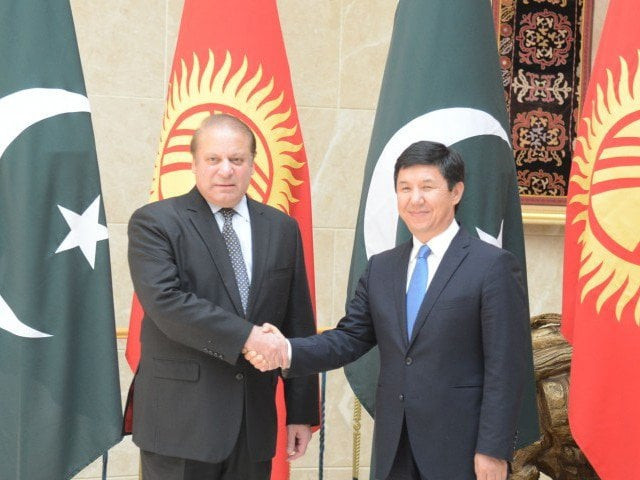Refurbishing foreign policy
If Pakistan is to ever move forward, then the energy nut has to be cracked internationally

Prime Minister Nawaz Sharif shakes hands with Prime Minister of Kyrgyztan Sariev Temir in Bishkek, Kyrgyztan on May 21, 2015. PHOTO: PID
It is becoming ever clearer that Pakistan is having a major re-think in terms of where its long-term foreign policy needs to be aligned, and it makes every kind of sense to be developing and expanding interactions with Central Asian states. These are states with which we have no shared border but considerable convergent interests, and the states of Central Asia are undoubted beneficiaries of the CPEC — this being all the more reason why political infighting and manoeuvring are distinctly unwelcome at this early stage of the project.
Unlocking the potential for regional development is not going to be easy or trouble-free, but if Pakistan is to ever move forward, then the energy nut has to be cracked internationally (and the education nut domestically). There will be tensions around any project developed in partnership with Iran, but Iran is likely to be a key future partner in building the energy mix, and the threat of US sanctions is under review. The US is edging towards a nuclear deal with Iran and with the Islamic State taking swathes of Syria and Iraq, the future of geopolitical relations of this region are bound to undergo some change. The natural partners for Pakistan are not in the Gulf and the states of the Arabian Peninsula; these are marriages of convenience that have tied the country to an ideology that is ultimately corrosive to national cohesion, and created an unhealthy dependency on an unsustainable energy source. Refurbishing relations with Kyrgyzstan and Turkmenistan is much to be welcomed, and we support the government in this endeavour — the diplomatic equivalent of healthy eating.
The Express Tribune, May 25th, 2015.
Like Opinion & Editorial on Facebook, follow @ETOpEd on Twitter to receive all updates on all our daily pieces.















COMMENTS
Comments are moderated and generally will be posted if they are on-topic and not abusive.
For more information, please see our Comments FAQ